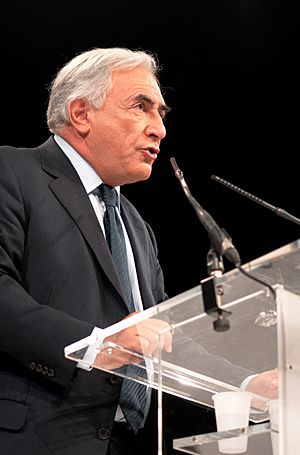Dominique Strauss-Kahn facts for kids
{{Infobox officeholder | name = Dominique Strauss-Kahn | image = Strauss-Kahn, Dominique (official portrait 2008).jpg | caption = Official portrait, 2008 | deputy = John Lipsky | office = Managing Director of the
International Monetary Fund | term_start = 1 November 2007 | term_end = 18 May 2011 | predecessor = Rodrigo Rato | successor = Christine Lagarde
| module =
Dominique Gaston André Strauss-Kahn (born 25 April 1949), often called DSK, is a French economist and politician. He is a member of the French Socialist Party. He was the head of the International Monetary Fund (IMF) from 2007 to 2011.
Strauss-Kahn was a professor of economics and also served as France's Minister of Economy and Finance from 1997 to 1999. He was a popular figure in French politics.
In 2007, he was appointed managing director of the IMF with support from French President Nicolas Sarkozy. He resigned in May 2011 after facing serious personal accusations. These events ended his political career. He had been a favorite to win the Socialist Party's nomination for the 2012 French presidential election. After he dropped out, François Hollande became the party's candidate and won the election.
After leaving politics, Strauss-Kahn began working in the private sector. He has advised governments on their country's finances.
Contents
{{Infobox officeholder |embed=yes |office1 = Minister of the Economy, Finance, and Industry|primeminister1 = Lionel Jospin|term_start1 = 4 June 1997 |term_end1 = 2 November 1999 |predecessor1 =
|successor1 = Christian Sautter |office2 = Mayor of Sarcelles |term_start2 = 23 June 1995 |term_end2 = 3 June 1997 |predecessor2 = Raymond Lamontagne |successor2 = François Pupponi |office3 = Minister of Industry and Foreign Trade |primeminister3 = Édith Cresson
|
|||||||||||||||||||||||||||||||||||||||
|
|||||||||||||||||||||||||||||||||||||||
| Personal details | |||||||||||||||||||||||||||||||||||||||
|---|---|---|---|---|---|---|---|---|---|---|---|---|---|---|---|---|---|---|---|---|---|---|---|---|---|---|---|---|---|---|---|---|---|---|---|---|---|---|---|
| Born |
Dominique Gaston André Strauss-Kahn
25 April 1949 Neuilly-sur-Seine, Seine, France |
||||||||||||||||||||||||||||||||||||||
| Political party | Socialist Party | ||||||||||||||||||||||||||||||||||||||
| Spouses |
Hélène Dumas
(m. 1967; div. 1984)Brigitte Guillemette
(m. 1984; div. 1989)Anne Sinclair
(m. 1991; div. 2013)Myriam L'Aouffir
(m. 2017) |
||||||||||||||||||||||||||||||||||||||
| Children | 5 | ||||||||||||||||||||||||||||||||||||||
| Education | HEC Paris Sciences Po Paris Institute of Statistics Paris Nanterre University |
||||||||||||||||||||||||||||||||||||||
| Signature | |||||||||||||||||||||||||||||||||||||||
Early Life and Education
Dominique Strauss-Kahn was born on April 25, 1949, in Neuilly-sur-Seine, a suburb of Paris, France. His father, Gilbert Strauss-Kahn, was a lawyer. His family has Jewish roots from the Alsace region of France and from Tunisia.
In 1951, his family moved to Morocco. After an earthquake in 1960, they moved to Monaco. Later, the family returned to Paris. He attended several famous schools, including HEC Paris and Sciences Po. He earned a PhD in economics.
Family Life
Strauss-Kahn has been married four times and has five children. He married his first wife, Hélène Dumas, in 1967. They had three children together before their marriage ended.
He later married Brigitte Guillemette, and they had one daughter. In 1991, he married his third wife, Anne Sinclair, a well-known French journalist. In 2017, Strauss-Kahn married Myriam L'Aouffir, a communications expert.
Career in Politics
Strauss-Kahn began his career as an economics professor. He became active in politics in the 1970s, joining the Socialist Party.
In 1986, he was elected to the National Assembly, which is part of the French Parliament. He quickly became known for his knowledge of finance.
Government Minister
In 1991, Strauss-Kahn was appointed as a junior minister for industry and foreign trade. He served in this role until 1993.
In 1995, he was elected mayor of the town of Sarcelles.
After the Socialist Party won the 1997 elections, Prime Minister Lionel Jospin made Strauss-Kahn the Minister for Economics, Finance, and Industry. This was a very powerful position. During his time as minister, France's economy grew, and unemployment went down. He helped prepare France to join the Eurozone and use the euro as its currency.
In 1999, he resigned from his position as minister to deal with legal accusations. He was cleared of all charges in 2001 and was re-elected to the National Assembly.
Path to the IMF
After 2002, Strauss-Kahn was a key member of the Socialist Party while it was in opposition. He helped create the party's program for the 2007 French presidential election. He tried to become the Socialist candidate for president in 2007 but lost to Ségolène Royal.
Even though he was from an opposing political party, French President Nicolas Sarkozy supported Strauss-Kahn to become the head of the International Monetary Fund (IMF).
Head of the International Monetary Fund
The International Monetary Fund (IMF) is an organization that works to keep the global financial system stable. It helps countries with their economies.
On September 28, 2007, Strauss-Kahn was chosen as the managing director of the IMF. He had support from the European Union, the United States, and China. As head of the IMF, he played a major role during the 2008 financial crisis. He worked to provide aid to European countries that were struggling with debt. Many people thought he was a strong and effective leader for the IMF.
In 2011, Strauss-Kahn's time at the IMF came to a sudden end. He resigned on May 18, 2011, after he was arrested in New York City because of serious accusations made against him. This event stopped his political career and his plans to run for president of France.
Later Career
After leaving the IMF, Strauss-Kahn returned to the private sector. He has worked as a consultant and board member for several international companies and banks.
- Russian Banks: In 2013, he joined the board of a Russian bank that is part of the state oil company, Rosneft.
- Adviser to Governments: He has worked as an economic adviser to the governments of Serbia and South Sudan.
- Investment Banking: He started an investment banking firm called LSK, but the company later went out of business.
 | Lonnie Johnson |
 | Granville Woods |
 | Lewis Howard Latimer |
 | James West |


